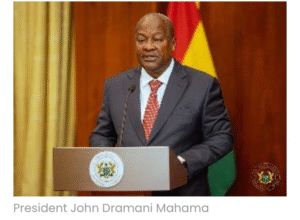Mahama Describes GHS1 to $1 Exchange Rate as Extreme” Warns of Export Sector Collapse

Former President John Dramani Mahama has cautioned against the idea of the Ghanaian cedi reaching parity with the US dollar, describing such a scenario as extreme and economically harmful.
Speaking at a stakeholder engagement in Accra on the implementation of his economic policies, the National Democratic Congress (NDC) flagbearer stated that while the recent appreciation of the cedi is commendable, a GHS1 to $1 exchange rate would not be sustainable.
“Some people say it will come to GHS1 to $1. No, that’s extreme. We’ll eventually collapse our export sector if that happens,” Mahama warned.
According to him, the recent appreciation of the cedi is the result of coordinated efforts between the Ministry of Finance and the Bank of Ghana through sound fiscal and monetary policies, not artificial interventions.
“The cedi has recently appreciated in value. It is the result of close coordination between fiscal and monetary authorities the Central Bank and the Ministry of Finance and it is based on forex auctions and natural demand and supply,” he explained.
Mahama emphasized that the strengthening of the cedi reflects its true market value, driven by economic fundamentals. He added that the Bank of Ghana is monitoring the situation and will intervene if the exchange rate falls below an acceptable threshold.
“If it goes below a certain floor, I am sure the Bank of Ghana will intervene to ensure the cedi remains within a certain band that reflects its true value,” he noted.
He urged Ghanaians not to panic about the recent appreciation and assured that the monetary authorities are keeping a close watch on the foreign exchange market.
Bank of Ghana Denies Manipulating Cedi Appreciation
Meanwhile, Dr. Johnson Asiamah, Governor of the Bank of Ghana, has clarified that the Central Bank is not using Ghana’s international reserves to prop up the cedi.
Speaking at the Ghana CEO Summit on Monday, May 26, 2025, Dr. Asiamah revealed that the cedi has appreciated by 24.1% against the US dollar. He insisted that the appreciation is market-driven and not the result of artificial support.
“Let me emphasise that the Central Bank is not using international reserves to support the cedi, nor are we engineering an unsustainable appreciation,” he stated.
Dr. Asiamah attributed the cedi’s performance to a combination of disciplined monetary policy, improvements in remittance inflows, and enhanced market surveillance.
These are not short-term interventions. They are deliberate, structural changes aimed at ensuring long-term stability of the currency,” the BoG Governor explained.
He also credited forex auction reforms and improved foreign exchange management practices as key contributors to the recent stability in the cedi.
Both Mahama and Dr. Asiamah agree that the recent appreciation of the cedi is rooted in sound economic fundamentals and not short-term fixes. However, while Mahama welcomes the strengthening of the local currency, he warns against unrealistic expectations that could hurt Ghana’s export competitiveness. As the nation navigates economic recovery, maintaining a stable and realistic exchange rate remains a top priority for both the Central Bank and policymakers.
